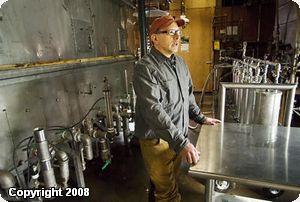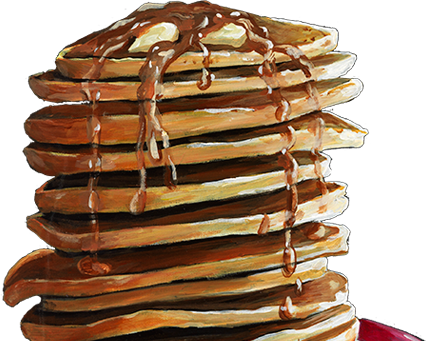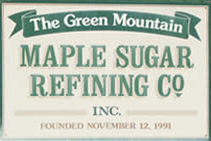March 7, 2008
By Joel Banner Baird
Free Press Staff Writer
 BELVIDERE — It sounded like a truck letting off its air brakes Thursday in the boiler room of the Green Mountain Maple Sugar Refining Company. Wrong. It was just owner Joe Russo, testing a pneumatic valve cleaner.
BELVIDERE — It sounded like a truck letting off its air brakes Thursday in the boiler room of the Green Mountain Maple Sugar Refining Company. Wrong. It was just owner Joe Russo, testing a pneumatic valve cleaner.
At the back of the complex, a big diesel engine drove a generator and rack of torso-sized, water-cooled vacuum pumps. Their combined volume made conversation impossible. But the steam evaporator was quiet; it won’t fire up for a week or so. Sap runs strong but late in Belvidere. Russo moved quickly and easily through a maze that sometimes resembled a submarine’s engine room, sometimes a dairy. He stepped outside and squinted into the brilliant March sun. Shod in snowshoes, a tapping crew of 15 tramped through maple stands, snooping for leaks in the long vacuum lines.
Russo’s 500-acre sugar bush extends up the side of a steep, 2,900 foot hill. Barely sweet sap from about 50,000 trees feeds into progressively larger hoses and pipes. It drains into outdoor tanks with a total capacity of 110,000 gallons. At full throttle, the system burns through 75 gallons of oil per hour. It will refine 2,200 gallons of sap into a 55-gallon barrel of maple syrup every 20 minutes.
Russo comfortably juggles numbers. He designed the gizmo on the side of his room-sized evaporator that constantly adjusts the boiling temperature of syrup with fluctuations in barometric pressure. He designed the Russo Economizer that caps the evaporator, re-circulates heat and shaves 15 percent off his fuel bills. He oversaw the refurbishment of the cement-truck-sized steam boiler that heated the Springfield Hospital until the early 1990s. And he maintains a fleet of five 1950s-era Maytag wringer washing machines that clean his cloth filters. “You can’t buy one of these systems ready-made. You have to build one,” he said.
Russo started the old fashioned way. As a teenager, he worked a 500-tree sugar bush on his parents’ property in Delaware County, N.Y. — and convinced the local school board to give him 14 weeks off in the spring to complete the job. He developed a keener appreciation for producing syrup in kitchens; he studied culinary physics, chemistry and engineering at Delaware Valley College and the Culinary Institute of America in Hyde Park, N.Y.
Those studies honed his appreciation for steam. “Steam will give you 100 percent control,” Russo said. “There’s no danger of scorching; no hot spots and cooler spots. You get a strong, consistent boil without all those deviations you get from a 2,000-degree flame path. And you can keep things a whole lot cleaner.”
Inventive breed
Russo is not alone in his faith in steam, nor in his belief that syrup producers will forever adapt to new challenges, from oil prices to global warming. Tim Wilmot, a University of Vermont Extension maple specialist based at the Proctor Maple Research Center in Underhill Center, ventured to generalize. “Sugar producers are very inventive people,” he said. “They’re always tinkering with things; they take great pride in their production. It comes from sitting around the sugar houses at night, thinking:’What if I tried this … or if I tried that?'” Wilmot likes to tinker, too.
With his colleagues at the center, he designs and tracks research projects in reverse osmosis (the technology that greatly reduces the water content in sap), air-injection systems (which lighten the syrup’s color) and spout size (smaller diameters might help trees heal faster; smaller drill bits extend battery life in portable drills).
Another of Wilmot’s experiments: He embedded sensors in several Proctor maples that read out their vital signs in real-time graphs (available online), showing trunk, air, and soil temperature, as well as sap pressure. Mark Isselhardt, a research technician at the center, said the results of those experiments, as well as most of those undertaken by private operators are “open-source” — or available to the public.
“You probably won’t find another industry where competitors are so willing to share their technologies,” he said. “There are not a whole lot of tight secrets. They might not say exactly how many taps they have, or how much they’re producing, but they’re very willing to offer advice.”
Russo recently gave a workshop on steam systems for the Vermont Maple Sugar Makers’ Association. He said the levels of interest he encountered boosted his belief in his equipment and his product. But not in that order. “I’ve been called a lot of things; an inventor is just one of them,” he said. “We’re part of a wonderful tradition. That doesn’t mean we shouldn’t be technologically advanced. “Ultimately, we all just have to protect the Vermont brand,” he continued. “We always have to make the best. That’s the point.”
Contact Joel Banner Baird at 660-1843 or joelbaird@bfp.burlingtonfreepress.com



